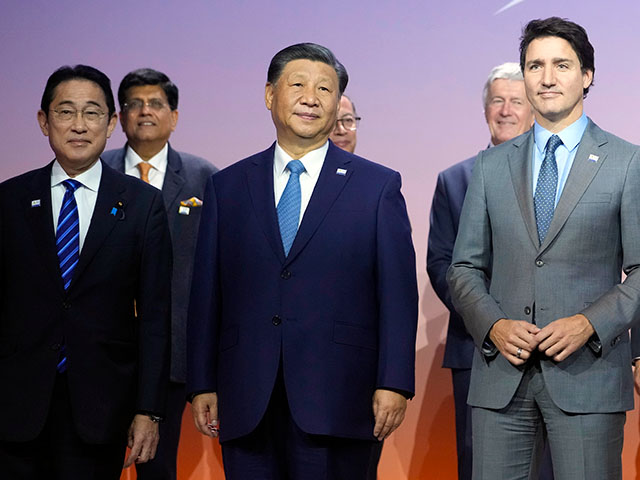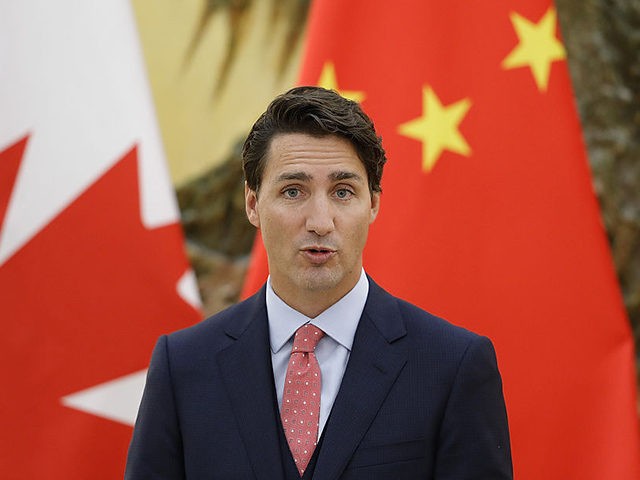Canadian Prime Minister Justin Trudeau testified before a probe into foreign election interference on Wednesday that China’s meddling in the past two elections did not change the outcomes.
Trudeau insisted it was “improbable” that China preferred any particular Canadian party, despite substantial indications that Beijing helped his Liberal Party defeat challengers who would have been tougher on the People’s Republic of China (PRC).

Japan’s Prime Minister Fumio Kishida, Chinese President Xi Jinping and Canada’s Prime Minister Justin Trudeau at the annual Asia-Pacific Economic Cooperation summit on November 16, 2023, in San Francisco. (AP Photo/Godofredo A. Vásquez)
Trudeau was responding to bombshell revelations on Monday that his administration was presented with evidence that China “clandestinely and deceptively interfered in both the 2019 and 2021 elections” by Canadian Security Intelligence Service (CSIS) but took no action.
The most obnoxious of these interference efforts targeted Conservative candidates whose seats were ultimately won by members of Trudeau’s Liberal Party, including Member of Parliament Kenny Chiu, who China aggressively targeted in 2021 and who lost his seat to a Liberal.
CSIS also found the PRC may have coerced Chinese students in Canada to support a preferred Liberal Party candidate, Han Dong, by threatening “their student visas would be in jeopardy and there could be consequences for their families back in the PRC” if they did not comply.
In the previously secret briefing document exposed on Monday, CSIS said “the timing of these efforts to align with Conservative polling improvements; the similarities in language with articles published by PRC state media; and the partnership agreements between these Canada-based outlets and PRC entities all suggest that these efforts were orchestrated or directed by the PRC.”
Former Conservative leader Erin O’Toole said Chinese interference cost his party up to nine seats in 2021, which was not enough to alter the balance of power in Parliament on its own, but would still represent an outrageous distortion of the Canadian election system. O’Toole said he brought his concerns to the Trudeau administration, but no action was taken.
Trudeau pushed back against these assertions in his sworn testimony before the intelligence commission investigating foreign election interference.
“Despite, yes, attempts by foreign states to interfere, those elections held in their integrity. They were decided by Canadians,” the prime minister said.
Trudeau claimed he never saw the blockbuster report divulged to the public on Monday, but he disputed the conclusion by CSIS that Beijing wanted a Liberal Party weakened to minority status in charge of Canada’s affairs.
“While individual officials may well have expressed a preference or another, the impression we got and consistently would get is that … it just would seem very improbable that the Chinese government itself would have a preference in the election,” he asserted.
CSIS told the investigating commission that while it firmly believes China sought to meddle in the past two elections in an organized and “pragmatic” manner, it is difficult to judge precisely how effective those efforts were. The intelligence agency also noted that some of its reports include information that is uncorroborated, or has not been fully investigated.
“What I am saying, you have to take this intelligence, you have to take this information, with a certain awareness that it still needs to be confirmed or it might not be 100-per-cent accurate,” Trudeau said in his testimony.
Other officials from Trudeau’s administration said they were aware of the warnings from CSIS and O’Toole’s complaint, but they felt the evidence was not strong enough to warrant an intervention that “could create more harm than good,” as Trudeau’s national security adviser Nathalie Drouin put it.
The Chinese government was enraged by Trudeau’s testimony because he took the allegations of election meddling too seriously for Beijing’s taste. An embassy spokesperson claimed Trudeau “slandered” China during the hearings.
“China strongly deplores and resolutely opposes this,” the spokesperson said.
The Chinese embassy in Canada issued a statement on Wednesday that insisted the PRC has never tried to interfere with any foreign elections.
“China has repeatedly emphasized its consistent principle of non-interference in internal affairs and has never had any interest in interfering in Canadian internal affairs. China has solemnly and clearly stated its position to Canada on numerous occasions during bilateral and multilateral engagements,” the statement said.
The embassy suggested some Canadian politicians are smearing the PRC and exploiting anti-China hatred in a “politically orchestrated farce. China’s state-run Global Times on Thursday accused Trudeau of being one of those desperate politicians:
Trudeau’s personal approval ratings have plummeted in the last six months and he needs to use such accusations to offset the public’s dissatisfaction with his handling issues such as the economy, housing, and climate change, Yao Peng, deputy secretary-general of the Canadian Studies Center of the Chinese Academy of Social Sciences, told the Global Times on Thursday.
“It is also another move of his leading the Canadian public, who are unaware of the truth, and the ‘deep state’ being hostile toward China, to engage in double-standards politics. This is his personal political agenda,” the Chinese expert said.
Imitating the US’ Cold War approach, the Canadian prime minister uses such aggressive accusations to counteract the rising popularity of the Conservative Party in Canada over the last six months, aiming to attract attention and divert public criticism from his party, Yao noted.
The Global Times added that China is actually the victim of foreign election interference, an amusing notion given that the brutal Communist tyranny does not permit anything resembling a free election. By “political interference,” the Global Times meant allegations of Chinese human rights abuses in places like occupied East Turkistan, Tibet, and Hong Kong. China dismisses all such accusations as insincere and hypocritical attempts to slander the regime in Beijing.

COMMENTS
Please let us know if you're having issues with commenting.